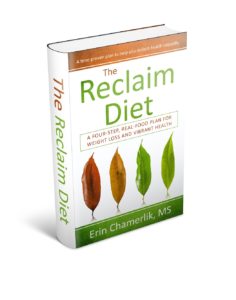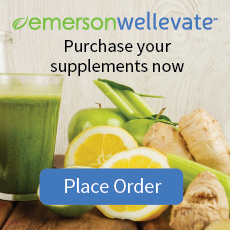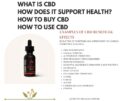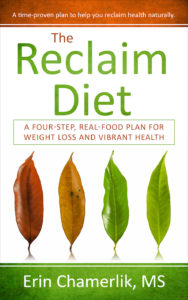
Stop Taking Calcium Supplements
Osteoporosis is not caused by a calcium supplement deficiency. Osteoporosis is a complex condition with many factors including nutrition, exercise, hormone balance, lifestyle factors and digestive health. It is preventable and can often be reversed — yes, you can use nutrition to rebuild bones out of osteoporosis.
If you were encouraged to have a bone scan you may have been sucked into a medical lie that starts with inappropriate testing and harmful recommendations for drug and supplement treatment. In the end you become a fearful compliant patient who continues to pay for tests, supplements and drugs that are not helping. For most people, calcium supplementation is unnecessary and can actually be dangerous. One unexpected outcome is tissues, cells and organs can become calcified, a condition known as pathological (ectopic) calcification
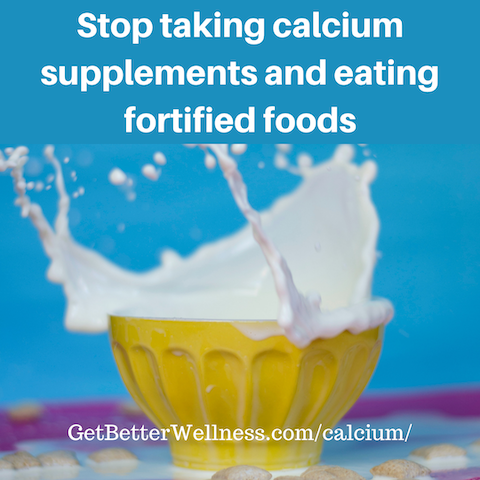
The medical lie: Create diseases (osteopenia, osteoporosis), convince women to get expensive scans and take harmful drugs like Fosamax
In the 1990’s The World Health Organization redefined the normal aging process as a disease when it defined osteopenia and osteoporosis as skeletal diseases. The standard for normal bone mineral density (BMD) was set at levels for a young adult female at peak bone mass, an arbitrary rating system designed by the World Health Organization. Would anyone expect a healthy 70-year-old to have the same bone density as a 30-year-old?
Drug manufacturer, Merck, developed Fosamax (Alendronate) as a treatment for osteoporosis. In 1995 the United States Food and Drug Administration approved the drug. It is well known that bisphosphonates, like Fosamax, can cause low-impact femur fractures and osteonecrosis of the jaw. (source) (source)
Bone density testing is useless
“T-scores are based on the young adult standard (30-year-old) bone density as being normal for everyone, regardless of age, whereas the much more logical Z-score compares your bone mineral density to that of your age group, as well as sex and ethnic background,” wrote Sayer Ji in his article, The Manufacturing of Bone Disease: The Story of Osteoporosis and Osteopenia.
For most healthy people the risk of fracture is low. Osteoporosis is an example of disease mongering. When corporations change the way people think about bone loss to create fear in women regarding aging and thinning bones, a lot of money can be made. Drug companies have extensive ties in funding meetings, disease foundations, studies, and advertising campaigns — all to create misinformation and fear to drive profits. (source)
The over-marketing of calcium
Calcium is important but we should be getting it from our diet. Calcium supplementation is a wide-spread practice and many physicians promote taking calcium to improve bone density. Calcium has been over-marketed and now has become a billion dollar market with 61% of women over age 60 taking calcium supplements. (source)
Calcium carbonate supplements are not healthy for humans
Calcium supplements frequently use cheap calcium carbonate that is not a bioavailable form. Calcium carbonate is found in chalk, rocks, limestone, marble, egg shell and oyster shell. It is the most common calcium sold in drugstores and recommended by doctors. Calcium carbonate does not support bone health and may actually harm health, increasing the risk for cardiovascular events. (source)
Are you consuming too many calcium-hyped supplements and food products?
Here is a hypothetical daily intake for someone who is concerned that they need to increase their intake of calcium for strong bones. The typical supplement and fortified foods on the market are using a form of calcium that comes from rocks. Instead of providing health benefits, the body is being flooded with a substance that can have devastating long-term outcomes. In the example below, the intake of junk calcium totals nearly 6,000 mg calcium for one day. According to the National Institutes of Health, adults over age 50 need 1000 mg and 1200 mg calcium per day. (source)
- Daily supplement – 1200mg Calcium carbonate
- Chocolate Calcium Chew – One chew, twice a day – 1,000 mg Calcium carbonate
- Homestyle Waffles – Two fortified waffles – 260mg Calcium carbonate
- Orange Juice – 8oz Juice fortified with calcium and Vitamin D – 350mg Calcium phosphate
- Chewable Antacid – Two tablets – 2,000 mg Calcium carbonate
- Protein Shake – 590 mg calcium from various sources
- Gluten-free, Dairy-Free Pizza – 297 mg Calcium phosphate
- Sandwich with two slices whole grain white bread, 295mg calcium from various sources
The calcium-fortified food market is projected to gain significant value through 2022-2032. (source) Getting people to believe that they need calcium supplements and calcium-fortified foods for good health and strong bones is just another money-making scheme with disastrous health consequences.
Calcium supplementation does not reduce risk of fractures
A meta-analysis with seven cohorts totaling 170,991 women reported that calcium supplementation does not reduce the risk of hip fractures, and on the contrary, an increase in risk is possible. (source) (source) (source)
Excess calcium accelerates arterial calcification
Calcium intakes that consistently exceed the RDA of older adults, especially when a substantial amount of the calcium is derived from calcium supplements, may accelerate arterial calcification and raise the risk of cardiovascular events. (source)
Significant risk of coronary vascular disease from calcium supplementation
A meta-analysis of randomized, double-blind, placebo-controlled trials focusing on dietary calcium intake concluded that a dietary intake of 700–1000 mg per day or supplementary calcium intake of 1000 mg per day significantly increased the risk of Coronary Vascular Disease (CVD) and Coronary Heart Disease (CHD). The meta-analysis found that calcium supplements increased a risk of CVD by about 15% in healthy postmenopausal women. (source)
The findings above are worrisome given that the current guidelines for the prevention and treatment of osteoporosis recommends adequate intakes of dietary calcium ranging 1000–1200 mg/day for adults aged 50 and older. (source) The Recommended Dietary Allowance (RDA) for calcium for women over 50 years is 1200 mg/day. (source) When dietary sources of calcium do not measure up to the above recommend levels, supplementation is often recommended by well-meaning, but ill-informed physicians and dietitians.
Is your calcium supplement increasing your rate of fracture, stroke and heart attack?
Supplementing with inorganic calcium supplements (calcium carbonate, oyster shell, egg shell, dolomite, bone meal) and using over-the-counter products and medications (Os-Cal, Caltrate, Titralac, Cal-Mint, Calcium-Chew, TUMS, Alka-Seltzer) or consuming fortified foods (waffles, cereal, snack bars, bread, baked goods, plant-based milks, drinks) instead of eating calcium-rich unprocessed foods may lead to heart attacks and excess calcium in joints and arteries.
Inorganic calcium supplements and fortified foods hardens arteries, calcifies joints, may lead to heart attack
It is best to get your required level of calcium from a whole food diet to avoid the possible side effects from inorganic calcium supplements and calcium-fortified foods. It is important to understand that calcium derived from inorganic sources like limestone, rocks, dolomite, di-calcium phosphate, tri-calcium phosphate, coral, hydroxyapatite, and bone meal are not as usable as calcium found in whole food.
Calcium from plants is usable
In the beginning, the earth was blessed with rich, fertile soil and lush vegetation. The soil was teaming with microbes — bacteria, fungi, and protozoa, to name a few. In the perfect cycle of life, microbes in the soil break down dead plant material and create substances and nutrients that nourish plants. When humans eat these plants, we enjoy the nutrients that they provide. Plants absorb inorganic calcium from the soil and convert it to organic calcium that the body can utilize. (source) It is the intended, perfect cycle of life.
The standard advice that we need 1,000 mg of calcium, or more, does not take into account the source of calcium and usability. Food with calcium is more absorbable and usable that supplements or fortified foods using inorganic calcium, dropping the daily target to less than 500mg per day. Supplementing with inorganic calcium sources is linked to many health problems:
- Myocardial infarction. A meta-analysis (including eleven randomized controlled trials) estimated that calcium supplements have up to 30% increase risk for myocardial infarction. (source) (source)
- Digestive issues. Calcium supplementation may increase digestive problems including constipation, diarrhea and abdominal pain. (source)
- Kidney stones may be caused by calcium supplementation. (source) (source)
- Colorectal neoplasms (cancer or tumors of the colon or rectum) risk increases. (source)
- Prostate cancer risk increases. (source) (source)
- Age-related macular degeneration (AMD) risk increases. (source)
- Metabolic syndrome prevalence increases. (source)
Many types of calcium supplements are derived from rock and bound to some sort of acid:
- Calcium citrate (citric acid)
- Calcium lactate (lactic acid)
- Calcium ascorbate (ascorbic acid)
- Calcium gluconate (gluconic acid)
- Calcium formate (formic acid)
- Calcium citrate malate (citric acid and malic acid)
Calcium bound with acid is more bioavailable than the popular, and cheap, calcium carbonate, but these forms are also derived from rocks. (source) (source) (source)
Bones need more than calcium
“Bones are made of at least a dozen minerals and we need all of them in perfect proportions in order to have healthy bones and healthy bodies. If you get too much calcium, through food sources or by taking supplements, you set yourself up for an array of negative health consequences, including obesity, Type 2 diabetes, Type 2 hypothyroidism, hypertension, depression, problem pregnancies and more.” Robert Thompson, MD, The Calcium Lie II: What Your Doctor Still Doesn’t Know: How Mineral Imbalances Are Damaging Your Health (source)
Most physicians are aware of the importance of vitamin D, calcium and exercise for proper bone health. Physicians are less likely to be aware that several other vitamins and minerals are associated with improved bone strength independent of vitamin D and calcium. We also need sufficient magnesium, Vitamin K1, Vitamin K2, boron, Vitamin C (essential for the formation of collagen), copper, zinc, manganese, chromium, vanadium, strontium, arginine, inositol and silica for bone health. Nutritional needs for bone health can be met with proper food choices. (source) Most people will need to supplement their diet with Vitamin D3 with K2 and magnesium.
“Without Vitamin K2, the body cannot direct calcium to the bones where it’s needed; instead, the calcium resides in soft tissue (like the arteries) — leading to a combination of osteoporosis and atherosclerosis, or the dreaded “calcium paradox.” Kate Rheaume-Bleue, ND, Vitamin K2 and the Calcium Paradox: How a Little-Known Vitamin Could Save Your Life (source)
Ideally get calcium from diet, not supplements
Dietary intake and absorption of calcium-containing foods is essential to provide sufficient calcium to maintain healthy body stores. Calcium absorption is a function of active transport that is controlled by having adequate Vitamin D levels. Low levels of Vitamin D can impair absorption of calcium from the intestines. (source) Food sources of calcium provide bioavailable sources.
Include Unprocessed Foods with Calcium but not pasteurized milk
When looking for food sources of calcium, many people turn to milk. Most milk and milk products are from pasteurized and homogenized milk. The pasteurization process heats the milk and destroys some immune-enhancing components, nutrients and enzymes in milk. Proteins and enzymes are denatured and the calcium will be inorganic. (source) (source) (source) (source) (source) (source)
The more cow’s milk people drink the more likely they will have a bone fracture
A cohort study published in 2014 tracked 61,433 women aged 39 to 74 over 20 years and 45,339 men of similar age for 11 years. The study found that the more cow’s milk people drank, the more likely they were to die or experience a bone fracture during the study period. High milk consumption is associated with mortality and fractures in women and men. (source)
Raw milk and fermented milk foods like raw cheese, kefir and yogurt are better options. Dietary sources of calcium include vegetables in the brassica family, dark leafy greens, nuts, seeds, herbal tea infusions (start with nettle leaf). (source)(source)
- Collard greens, 1 cup, 266mg calcium
- Beet greens, mustard greens, 1 cup, 175mg
- Cabbage, Broccoli, Brussels Sprouts, 1 cup, 60mg
- Cheese, Raw Cheddar, 1 oz, 250mg calcium
- Almonds, 1/4 cup, 92 grams calcium
- Sunflower seeds, 1/4 cup, 25 grams calcium
- Sesame Seed Butter, 60 mg/tablespoon
- Orange, 50mg
You can prevent and reverse osteoporosis
In my book, The Reclaim Diet, A Four-Step, Real-Food Plan For Weight Loss And Vibrant Health, I dive into the topic of dairy, grains and soy to help shed light on why these foods are not building health. When you follow this real-food eating plan you will have nutrients that your body needs to build healthy bones.
What about getting calcium from fish with bones?
Many people are told to eat canned sardines and canned salmon with soft bones for a source of calcium, but humans don’t have the ability to grind bones with our teeth or assimilate that form of inorganic calcium. There are other healthy reasons to consume sardines without bones. Sardines are a sustainable, oily fish rich in Omega 3 fatty acids, protein, amino acids, Vitamin D, B12 and selenium. (source) These are bone-building nutrients.
If your diet is right, you don’t need calcium supplements
It may be hard to believe that proper nutrition will give you what you need for building strong bones. Many people will need to supplement Vitamin D3 with K2 (as MK7) and magnesium.
If you choose to supplement calcium, look for an organic plant-based supplement — not a supplement that comes from rocks.
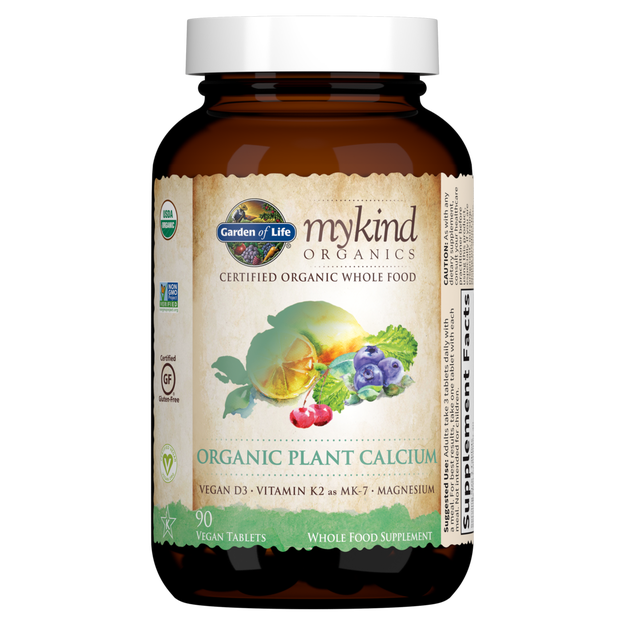
- 800mg of Plant-Sourced Calcium from Organic Algae
- With Magnesium, Vitamins D3 and K2 as MK-7
- Made with Over 20 Organic Fruits and Vegetables
- Easy-to-Digest, Plant-Sourced Calcium (Not From Crushed Rocks)
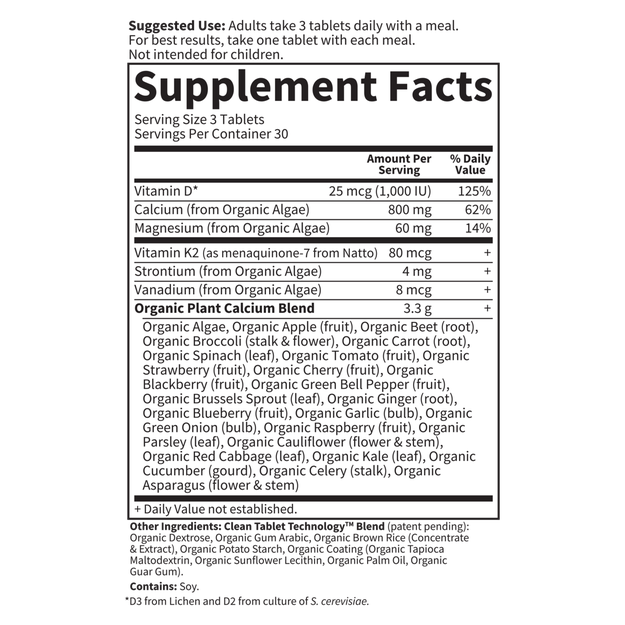
15% Off Professional Supplements
Recommended
-
IpriflavoneMarch 29th, 2025
-
How to Make Bone Broth – Chicken Bone BrothMarch 11th, 2025
-
GABA Reduces Stress and Enhances SleepMarch 6th, 2025
-
Boron’s Role in Hormones, Inflammation, Bones, Teeth, Memory, Immune function and Cancer ReductionMarch 3rd, 2025
-
What is CBD? How does it support health?February 17th, 2025

